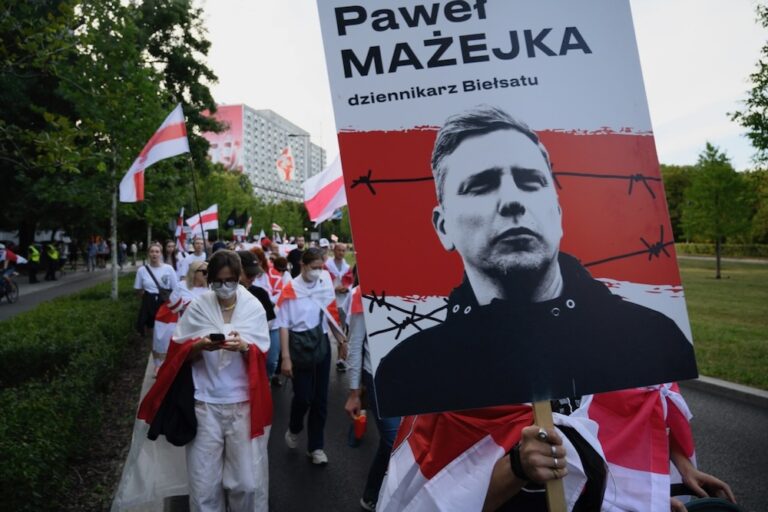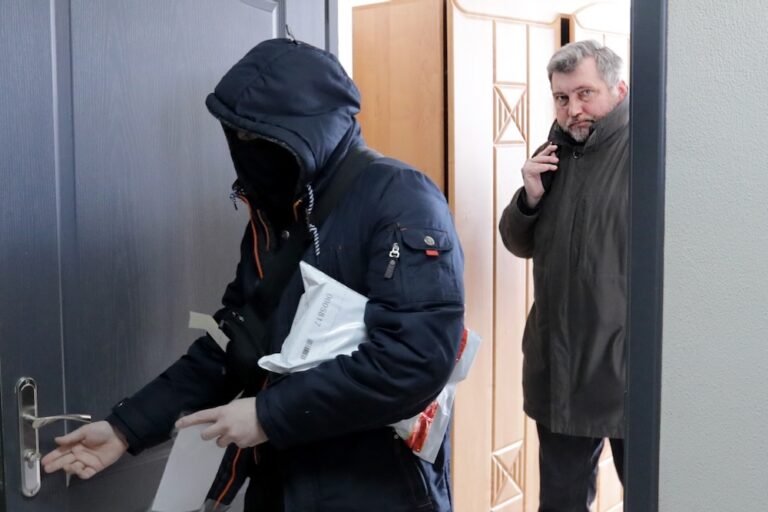(ARTICLE 19/IFEX) – The following is a 21 February 2002 ARTICLE 19 letter to President Aleksandr Lukashenka: 21 February 2002 H.E. Aleksandr Lukashenka Presidential Administration ul. Karla Marksa 36 220010 Minsk Belarus Fax: +375 17 223 58 25 Dear President Lukashenka, I am writing to express ARTICLE 19’s concern about the recent adoption in Parliament […]
(ARTICLE 19/IFEX) – The following is a 21 February 2002 ARTICLE 19 letter to President Aleksandr Lukashenka:
21 February 2002
H.E. Aleksandr Lukashenka
Presidential Administration
ul. Karla Marksa 36
220010 Minsk
Belarus
Fax: +375 17 223 58 25
Dear President Lukashenka,
I am writing to express ARTICLE 19’s concern about the recent adoption in Parliament of the Law “On the Fight Against Terrorism”. Although ARTICLE 19 recognises the importance of the fight against terrorism, national and international, we believe that this Law contains a number of provisions that go beyond what is necessary to combat terrorism which, as a result, constitute an unjustifiable restriction on the right to freedom of expression. Our concerns are detailed below. I urge you to take the necessary steps to amend the Law to bring it into line with international human rights standards in this area.
State control of the media
Article 13 of the Law grants State authorities a number of powers to interfere with the right to freedom of expression. First, State authorities are granted the power “in the area of the conduct of a counter-terrorism operation ⦠to use for official purposes means of communication belonging to citizens, state agencies and organisations regardless of their form of ownership”. Second, the final paragraph of Article 13 states: “The Head of the Operational Headquarters (Head of the counter-terrorism operation) shall regulate the activities of media representatives in the area of conduct of the counter-terrorism operation.”
Both these provisions confer an open-ended power on State authorities to assume control over the media, the only qualifying provision being that the power can only be used during a ‘counter-terrorism operation’. It should be noted, first, that these powers are unnecessary and are not found in the laws of other States. The authorities simply have no need to take over communications facilities during an anti-terrorism operation, which would presumably consist of raids on people or equipment, or defusing an ongoing situation. Similarly, there is no need to regulate the activities of media representatives, over and above general controls on the movement of people for their protection or to prevent interference with the operation. Any controls on the content of media output (see below) are an entirely different matter.
Second, the powers granted to authorities under these provisions are extremely broad and hence potentially subject to abuse. International law does recognise that certain obligations may be imposed on public service broadcasters, for example to broadcast public warnings in times of national emergency. However, the powers conferred by this Law go far beyond this and are, indeed, unprecedented in their scope, allowing the State in effect to assume full control over the media. The broad nature of these powers is exacerbated by the loose definition in Article 3 of ‘terrorist activity’, which would include political demonstrations where some acts of violence occur. The powers conferred under Article 13 therefore constitute a serious restriction on the right to freedom of expression which cannot be justified, even in the context of counter-terrorism operations. We recommend that they be removed from the Law.
Free circulation of information
Article 15 of the Law prohibits dissemination of any information which, among other things, “discloses special methods or tactics used in conducting the counter-terrorism operation”, that “serves as propaganda for or justification of terrorism”, or that “contains information about” staff involved in anti-terrorist actions. While ARTICLE 19 recognises that the media should not publish tactical information which might endanger the lives of police officers and other state officials, the prohibition would inhibit any discussion in the media of law enforcement tactics. For example, there could be no discussion on the effectiveness of certain tactics used, even though this is a matter of legitimate public concern. The prohibition on dissemination of information that “serves as propaganda ⦠or justification” could seriously restrict public debate on matters of great public interest including, for example, serious discussion of the motives behind a terrorist attack. The absolute restriction on any information about anti-terrorist officers is similarly seriously overbroad. A critique of the approach adopted, or indeed any serious discussion about an anti-terrorist incident, may well include some information about staff involved and yet in no way undermine or inhibit anti-terrorist action. As the European Court of Human Rights has often noted, “[the right to freedom of expression leaves] little scope ⦠for restrictions on political speech or on debate on questions of public interest” (see its recent judgment in the case of Feldek v. Slovakia).
Not only does Article 15 of the Law inhibit legitimate, and indeed crucial, public debate but it is also open to abuse on political grounds, potentially being used by the authorities to silence political opponents. We recommend that the three Sub-Articles in Article 15 noted above be removed from the law and that it focus exclusively on the second Sub-Article which prohibits only the dissemination of information “which hampers the conduct of the counter-terrorism operation”.
ARTICLE 19 calls on you to respect the international guarantee of freedom of expression, in particular by taking the necessary steps to amend this Law as indicated above.
Yours sincerely,
Andrew Puddephatt
Executive Director
Recommended Action
Similar appeals can be sent to:
H.E. Aleksandr Lukashenka
Presidential Administration
ul. Karla Marksa 36
220010 Minsk, Belarus
Fax: +375 17 223 58 25
Please copy appeals to the source if possible.
For further information, contact ARTICLE 19, 33 Islington High St., London N19LH, U.K. tel: +44 207 278 9292, fax: +44 207 713 1356, e-mail: europe@article1


